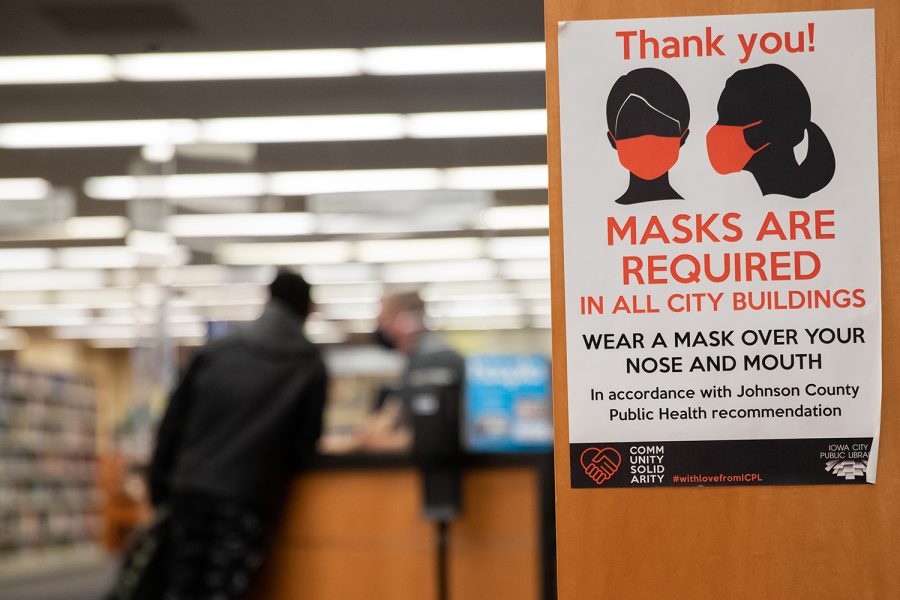Johnson County health care officials call for stop of omicron spread as cases rise
University of Iowa and Johnson County health care officials are asking Iowans to get vaccinated and receive their booster shots in the face of the highest COVID-19 case numbers and hospitalizations since the start of the pandemic.
The Iowa City Public Library is shown with mask mandate signs in Iowa City on Monday, Jan. 17, 2022.
January 17, 2022
Health care professionals are calling on Johnson County residents to stop the spread of COVID-19, as a significant rise in cases, partly due to the spread of the omicron variant, continues to put a strain on health care workers and hospitals.
In a University of Iowa Hospitals and Clinics Facebook Live Q&A on Jan. 14, Director for the Division of Infectious Diseases at the University of Iowa Dan Diekema said that there are a record number of COVID-19 cases in the U.S and Iowa, higher than at any other point during the pandemic.
“Because of the sheer number of cases with this new omicron variant, we have now exceeded the highest number of people hospitalized in the U.S. with COVID-19,” Diekema said. “The state of Iowa is seeing record numbers of cases and is seeing increased numbers of individuals hospitalized with COVID-19.”
According to the New York Times, as of Jan.16, an average of 364 cases per day were reported in Johnson County, a 230 percent increase from the average two weeks ago. Since the beginning of the pandemic there have been 26,588 reported cases in the county.
Diekema said unvaccinated people are at extremely high risk for infection due to this number and should be taking necessary safety precautions, including getting vaccinated.
RELATED: UI to stock health stations with KN95 masks
Sam Jarvis, Johnson County Public Health community health division manager, said health care professionals understand the strains of this pandemic, but hopes people will continue to follow masking guidelines and get vaccinated so Iowans can see an end to this pandemic.
“We continue to recommend that everyone take multiple steps to slow spread, including staying up to date on your COVID-19 vaccines, which include being fully vaccinated and getting your booster if you’re eligible,” Jarvis said. “Wearing [a mask] in indoor spaces needs to be a must, given the high amount of transmission, and staying home when one is ill is also extremely beneficial.”
Testing capacity is strained, so Johnson County Public Health is working with Test Iowa to get tests to people who need them, Jarvis said. He said the federal government is launching COVIDtests.gov, which will hopefully expand testing capacity.
In the UIHC Facebook Live Q&A, Executive Dean for the Carver College of Medicine Pat Winokur said people should be concerned about COVID-19 variants, specifically omicron, and their spread in the community.
“We are seeing that the omicron variant is more transmissible, and can increase transmission from person to person, making it harder to control,” Winokur said. “Omicron has more mutations than any of the previous variants and we are seeing the vaccines are not quite as good against the omicron strain for preventing infection.”
The good news with omicron, Winokur said, is that it causes less severe disease because it replicates more in the nose and throat and less in the lungs. She added that vaccination is continuing to prevent hospitalizations and death.
Vaccines are one of the most important ways for people to stop the spread and put an end to this pandemic, UIHC Chief Executive Officer Suresh Gunasekaran said in a press conference on Thursday.
“We know what’s most important is to get vaccinated,” Gunasekaran said. “We know that the incidence of disease is less amongst the vaccinated, and we know that the vaccinated do much better, even if they do get infected.”
RELATED: State Hygienic Lab confirms first case of omicron variant in Iowa
The New York Times also reported the test positivity rate in Johnson County is very high, which suggests that cases are being significantly undercounted.
Diekema said it’s important to get tested when someone experiences flu-like or cold-like symptoms, including sore throat, sinus congestion, cough, headache, fever, extreme fatigue, and loss of taste and smell. It’s also important for people to seek testing five days after an exposure to someone who has COVID-19, he said.
While the number of infected Iowans is concerning, Gunasekaran said there’s hope for the future if people follow safety practices.
“We continue to see rising numbers of infected Iowans that are causing health care to be modified and delayed, as we have to shift our operations to take care of COVID patients,” Gunasekaran said. “We apologize that this is the situation that we find ourselves in…But there is a solution, which is to work together and to stick to the safety standards that we know.”














